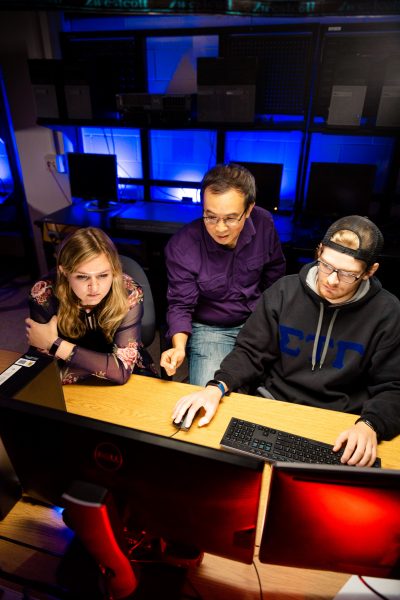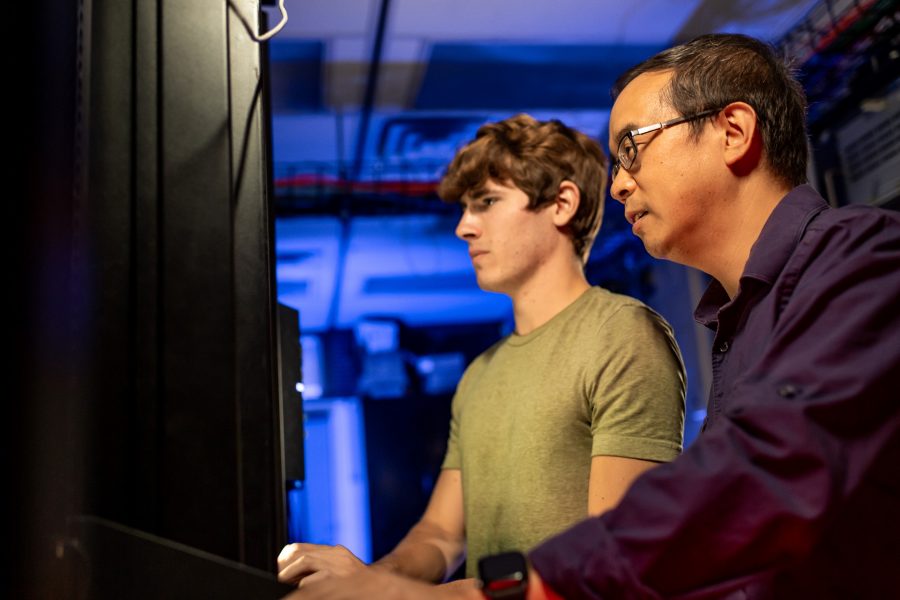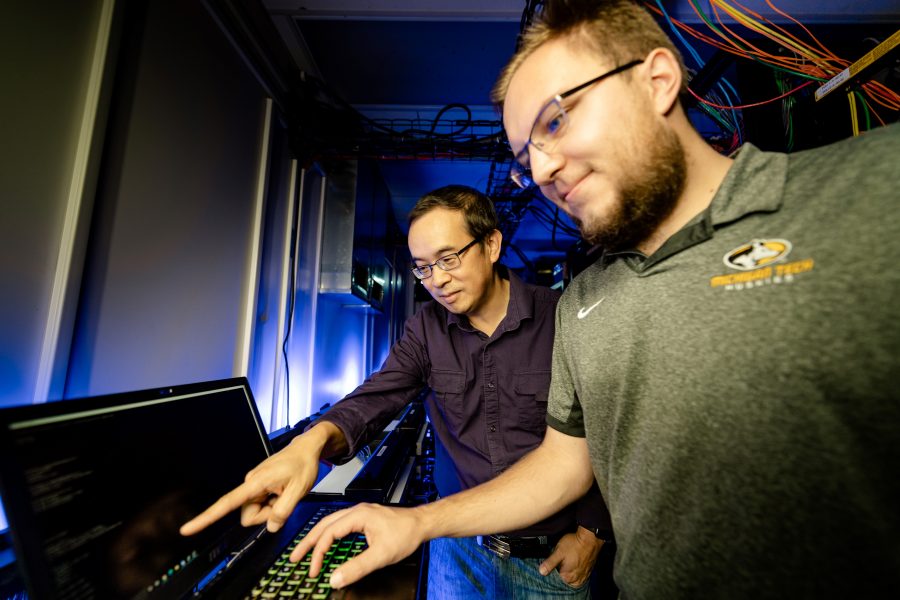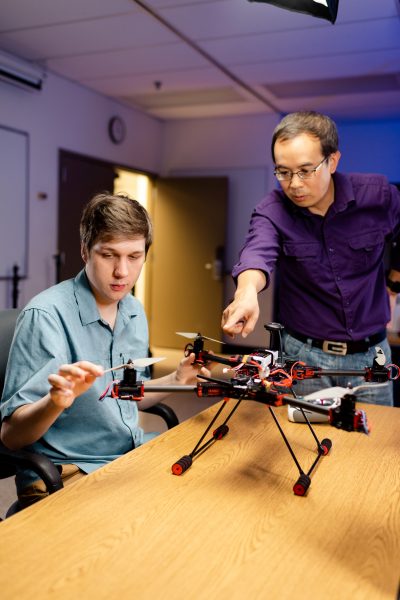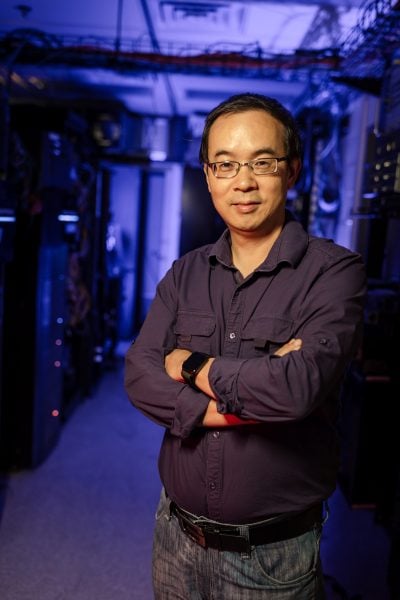
Author: Jessica Brassard
In the era of rapid technological advancement, artificial intelligence (AI) has emerged as a transformative force across domains, including cybersecurity. Dr. Yu Cai is a professor of cybersecurity in the College of Computing at Michigan Tech. His primary research area centers on cybersecurity and while he doesn’t consider himself an AI expert he acknowledges that AI’s impacts extend to cybersecurity and education. Together with Dr. Cai, we delve into the intricate interplay of cybersecurity, AI, and education.
Cybersecurity Activities at Michigan Tech
Michigan Tech has developed a national and international reputation in cybersecurity education, research, and outreach activities. Dr. Yu Cai is leading projects that have the power to shape the next generation of cybersecurity professionals and digitally responsible citizens. It’s not just for would-be experts; it’s for everyone.
One initiative is the “CyberCorps: Scholarship for Services Program.” This multimillion-dollar scholarship program, funded by the National Science Foundation (NSF), has a clear goal: to train the future cybersecurity workforce for the US government. The initiative offers full scholarships for two to three years to support students in their cybersecurity studies. In return, these graduates work for the US government for a period equal to their scholarship duration. It’s a win-win for both students and the nation’s security. With fifteen students already enrolled, the program provides a comprehensive cybersecurity education, and students dive into AI and machine learning. They’re not just learning in a classroom; they’re actively participating in cyber competitions like National Cyber League (NCL), security conferences like DEFCON, and various research projects.
CyberCorps scholars are active participants of RedTeam which is a cybersecurity student organization advised by Dr. Cai. RedTeam consistently ranks as a strong contender in various national cybersecurity competitions. This team has frequently achieved a place in the Top Ten at the national NCL competition which has thousands of participating teams across the nation. RedTeam also has secured the first place at GrrCON for three years in a row, along with high rankings in several other Capture The Flag (CTF) events.
Dr. Cai also knows the importance of reaching students earlier in their education, which led to the creation of the “GenCyber Summer Camps.” These free summer camps, hosted at Michigan Tech, are funded by the National Security Agency. The GenCyber program offers two types of camps: one for middle and high school students, and one for K-12 teachers. Over the past four years, it has reached an impressive 300 students and teachers from all over the country. It’s a fantastic opportunity to learn the essentials of cybersecurity and AI.
The “CyberHusky” program extends to students in middle and high school from the local area who gather every Saturday night to explore cybersecurity and machine learning. It’s a supportive and collaborative environment, where they participate in cyber competitions, enhancing their practical skills. CyberHusky students achieved top ten rankings in multiple national and state K-12 cyber competitions, such as CyberPatriot and Michigan Governor’s High School Cyber Challenge.
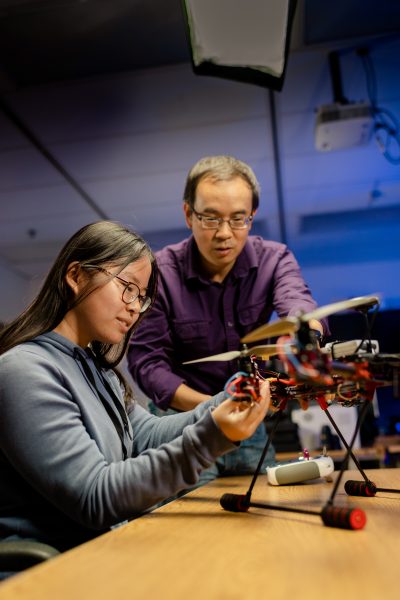
Cybersecurity Education and AI Integration
It’s essential to recognize that rapid AI-driven transformation poses significant challenges as well as opportunities for educators in computing and non-computing disciplines. Dr. Cai is taking the lead on some fascinating projects that may aid in the integration of AI in education. One of them involves training a large language model (LLM) to serve as a teaching assistant (TA). But it’s not your typical TA — it’s an AI-driven assistant that can handle commonly asked questions and FAQs from students. This LLM model is loaded with a customized database containing information about various courses and programs. It’s being designed to interact with students and generate human-like responses. Imagine having a virtual assistant to help with your coursework, answering questions quickly, and saving instructors time. This model can also be extended to provide academic advice and recommendations for course arrangements and academic advising.
Dr. Cai and his colleagues are in the process of developing a specialized course titled “Trustworthy AI.” Unlike typical AI courses that primarily concentrate on technical skills, this course places a strong emphasis on the critical aspects of AI such as privacy, security, and fairness. The curriculum is designed to equip students with a comprehensive understanding of not only the technological intricacies of AI but also its ethical implications. It also addresses the growing public concerns and keeps up with the evolving legislative landscape surrounding AI technologies.
Dr. Cai’s team is working on another innovative project called “CASE” (Case Analysis for Security Education) which is funded by NSF. This project is centered around creating realistic simulations of cyber-attacks and breaches, with a primary goal of providing hands-on learning experiences to students in computing courses. These simulations are designed to mimic the complexities and unpredictable nature of real-world hacking incidents, thereby preparing students for the challenges they may face in the field of cybersecurity. An integral component of the CASE project is the utilization of advanced AI. This AI is specifically engineered to adjust the complexity and intricacy of the simulated cyber-attacks in real-time, based on each student’s individual skill level and learning progress. This dynamic adjustment ensures that each student is presented with challenges that are neither too easy nor too difficult, thereby fostering a tailored and effective learning experience. The AI’s role in CASE is pivotal in ensuring that students not only understand the theoretical aspects of cybersecurity but also gain practical, hands-on experience in dealing with cyber threats.
Dr. Cai’s diverse range of projects contribute to expanding educational horizons in the realms of cybersecurity and AI. These projects are designed to do more than just demonstrate the capabilities of technologies; they aim to instill a deeper understanding and appreciation of the responsible use and ethical implications of AI and cybersecurity. By blending practical, real-world applications with theoretical knowledge, Dr. Cai’s work encourages students and participants to not only grasp the technical aspects but also to consider the broader societal impacts and ethical responsibilities that come with the development and implementation of such technologies.
